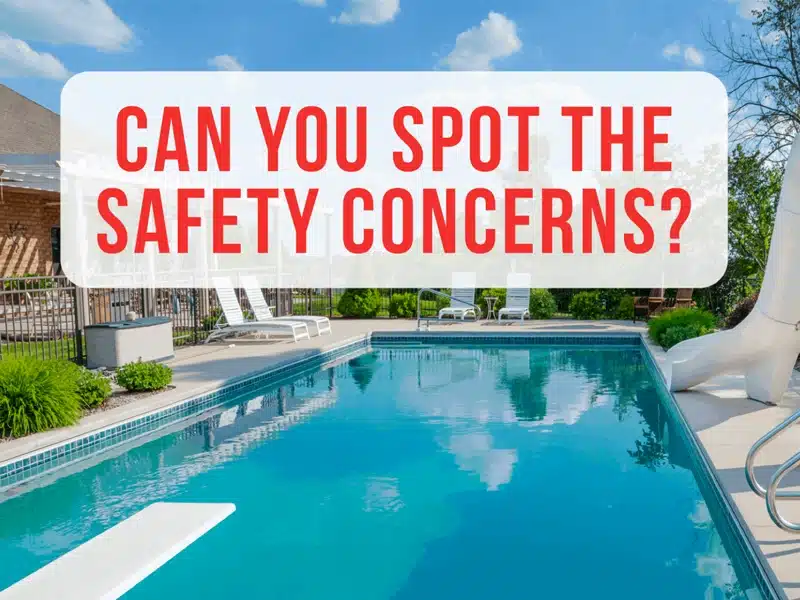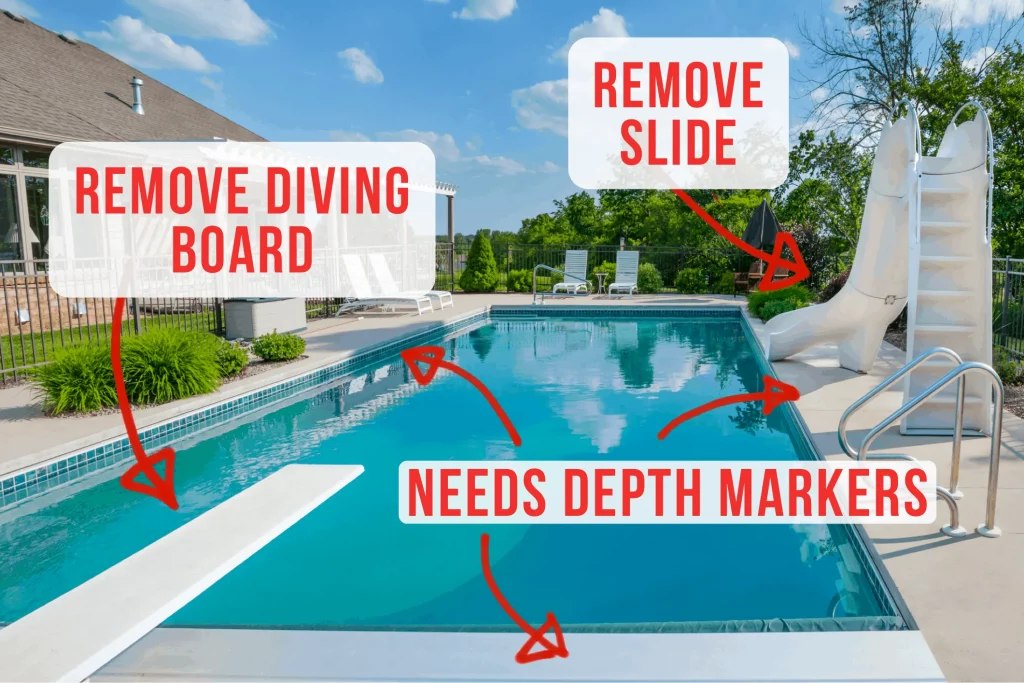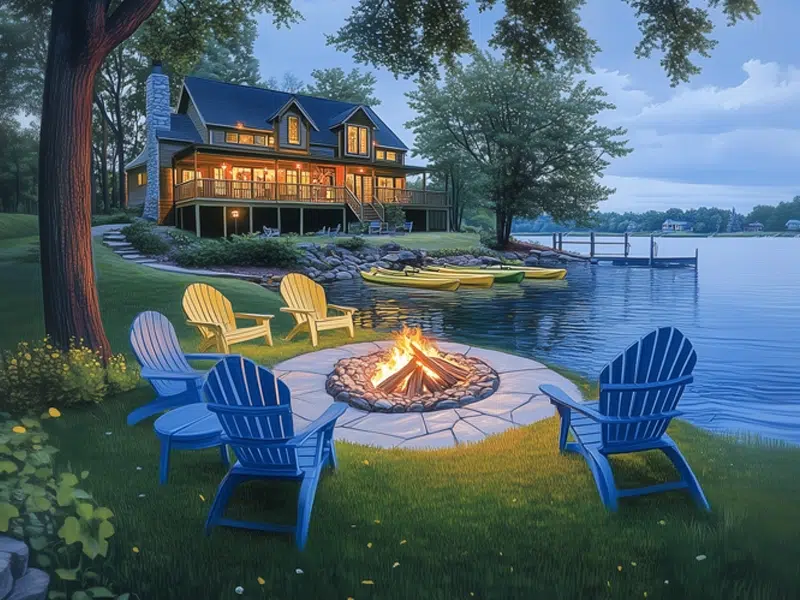Pool Safety Standards Every Vacation Rental Host Should Consider
Offering an amenity like a pool or a hot tub can undoubtedly help your listing make a splash on platforms like Airbnb and Vrbo when guests are comparing your property to others available in the area.
Before you invite your guests to dive in, you should understand the risks that amenities like pools, hot tubs, or lakefront properties bring to any short-term rental owner.
Ensuring the safety of your guests should always be your top priority. It starts by understanding the importance of pool safety with these tips and insights that will create a positively memorable stay for your guests.

Understanding Your Responsibility to Ensure Guest Safety
As the owner or host of a short-term rental property, you have a duty to prioritize the safety and well-being of your guests, especially when offering amenities like a pool, hot tub, or waterfront access.
Providing an enjoyable experience should never come at the expense of compromising guest safety.
Understanding the gravity of this responsibility is the first step toward becoming a responsible and trustworthy host.
If you neglect safety, you may face legal trouble if a guest gets injured (or worse) and claims that it happened because you didn’t take the appropriate safety precautions at your property.
When it comes to lawsuits in the U.S., you can be sued for just about anything, and there are endless opportunities for accidents at short-term vacation rental properties. This is, of course, where insurance comes in.
However, even insurance has its limitations, and if a guest can prove your negligence caused their injury, the more likely you are to exceed your insurance liability limits.
On the other hand, the more you focus on safety in your home, the less opportunity for negligence on your part. If there were an injury, this effort would not only increase your insurance company’s chances of winning the case but greatly reduce the potential payout ordered by a judge.
Overview of Pool-Related Incidents
Swimming pool injuries have surged with more than 184,000 emergency room visits reported in 2022, with nearly half of the injuries involving swimming activity (diving, jumping, etc.), apparel or equipment (diving boards, slides, pool floats, etc.) according to a recent study by ValuePenguin.
The study indicated that slips, falls, and unsupervised children are the most common safety incidents at personal pools, with children under 10 and males facing the highest risk.
When talking about swimming pool safety, it is also important to note that fatal drowning is the primary cause of death for children aged 1-4 and the second leading cause of unintentional death for children aged 5-14.
From an insurance perspective, claims due to injury at a pool are rather common, so anything you can do to reduce the risk of injury is a great place to start.
You simply don’t know who’s staying in your rental, and their ability to swim may vary widely.
Removing hazards such as diving boards, slides, and non-certified inflatable floatation devices can significantly reduce the chance of an accident.
Many listings neglect to address these issues because it’s not required, or they don’t think they will get as many bookings without these features. They simply don’t consider the risk.
Removing Hazards
Diving boards and slides are fun features at city pools for children and adults, but there is a huge liability concern when it comes to offering these features to your short-term rental guests.
Unlike city pools, there will be no lifeguard on duty if someone were to be injured. It’s also impossible to know the abilities of your guests and whether they understand how to use these items safely. This opens your business up to unnecessary legal risks in the event of an injury.
For these and other reasons, it’s important to hold your rental to pool safety standards, as many insurance providers may require you to remove your diving board, slide and inflatables to diminish the liability concern and potential for negligence on your part.
Implementing Depth Markers
Depth markers are a part of our pool safety standards, as you will notice at any public pool, such as a city pool or your local hotel. With depth markets on all four sides of the pool, families and guests are warned and can judge their and their children’s swimming capabilities accordingly. The pool safety standards should be the same at your short-term rental.
Having “warnings” in place can greatly reduce your negligence if a guest were to be injured at your pool. In addition to the depth markers, you will often see a ‘no diving’ sign at the shallow end. These details are important safety reminders for your guests.
If there were an accident, your insurance carrier would have a better chance of succeeding on a verdict if a guest and their lawyer saw an opportunity to claim their injury was due to your negligence.
A heart-wrenching incident involving 16-year-old Cameron Brown drowning in a vacation rental pool highlights the significance of disclosing crucial information to guests. Cameron’s parents emphasize the need for vacation rental platforms like Airbnb to require owners to list the pool’s depth.
In this particular case, the absence of depth information proved fatal. Transparency regarding pool depth allows guests to assess suitability and make informed decisions to mitigate risks.
Cameron’s father, Marcus Brown, shares his deep conviction that if they had known the pool’s depth beforehand, they would have made a different choice. He believes that mandatory disclosure of pool depth on vacation rental platforms is crucial in preventing similar tragedies.
By requiring owners to provide accurate and detailed information about pool depth, vacation rental platforms can contribute to a culture of transparency, responsibility, and, most importantly, guest safety.
Access to Rescue Equipment
Rescue equipment should be a priority for your vacation rental guests.
When you go to a hotel and use their pool, you’ll notice all types of warnings, waivers, and equipment in the water area, including rescue equipment (such as a lifesaving pool ring, pool hook, or buoy) which is always posted on a surrounding wall or somewhere close at hand.
You can bet the hotel is going to utilize all precautions to make sure their guests stay safe, and it should be no different for you as a short-term rental host who, by hospitality law, is subject to the same standards.
We’ve already discussed that you don’t know the abilities of your guests, and providing rescue equipment could help your guests stay safe if there were to be an accident. Including these safety features will also help your insurance carrier battle a lawsuit if your guest were to be injured or worse.
Caution with Pool Toys and Floats
While it isn’t a barrier to entry for some insurance, providing pool toys and floats to your guests could increase your liability exposure.
The reason is that by including them with your rental, you are inadvertently encouraging those who may not be the best swimmers to go for a dip, which could ultimately result in drowning.
Some floatation devices, like most life vests, are certified by the U.S. coast guard and come with proper use instructions. Your insurance company may advise that you only provide these devices as they are rated for safe use.
Others are simply buoyant materials that may pop or not support a floating guest. It’s best to remove these types of inflatable toys from your rental.

Peace of Mind Through Proper Underwriting
Adequate safety standards for pools (depth markers, rescue equipment, no diving board, etc.) are an underwriting requirement of many insurance carriers because they are a ‘known risk,’ meaning they’ve seen a high number of lawsuits involving these items in the past.
Underwriters may ask that you make changes to your property, such as adding depth markers on all four sides of your pool, in order to continue the insurance contract; however, if there were an injury at your property, your liability insurance would respond.
While this requirement may seem like a barrier to entry, there is typically a grace period in which the underwriters will notify you of potential risks and give you an opportunity to correct the issue without a gap in coverage.
Choosing a carrier with underwriters experienced with short-term rentals can be a huge help as they will review your property for potential risks. They’ve seen thousands of listings and hundreds of lawsuits making it easy for them to identify issues before an accident.
Ultimately, when accidents happen, you call your insurance carrier. You’ll have liability coverage if your property is underwritten and insured according to its use as a short-term rental.
It’s important to be open with your insurance carrier and ensure safety measures are appropriate for commercial use, not only your personal use.
Quote Your Short-Term Vacation Rental Today
Proper Insurance is the nation’s leading short-term vacation rental insurance provider, with the most comprehensive policy on the market.
We protect homes in all 50 states with unmatched coverage for your property, revenue, and business liability, customized to include guest-caused theft/damage, liquor liability, amenity liability (bikes, kayaks, hot tub, etc.), bed bugs, squatters, and more.
Proper’s policy covers vacation homes, townhouses, condos, duplexes, cabins, cottages, apartments, and more. With expert vacation rental underwriters, we can tailor a policy specific to your short-term rental property. Backed by Lloyd’s of London and exclusive endorsements from vacation rental leaders such as Vrbo, Proper Insurance is built on world-class insurance coverage.



